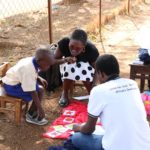Country
Year
Assignment
Funding
Theme
Scope of Baseline study
The ultimate aim of the DANBE project is for adolescent girls and women in the Ségou and Sikasso regions to exercise their right to appropriate health services and a life free of violence. The overall objective of the DANBE baseline study is to assess the project’s indicators at the start of its implementation and to research the baseline levels of women’s and adolescent girls’ CAPs on SRHR, EG, GBV prevention and management, as well as additional information on ACS+. Data collected during the baseline study were used to measure the degree and quality of change during and after project implementation, and throughout the project’s duration.
Methodology of Baseline study
Armel Oguniyi, Founder at ar-mel directed the research as the lead consultant. In a participatory, inclusive and gender-sensitive approach, the analysis was based on a qualitative method, which combined primary and secondary sources of data collection. The four main areas of gender analysis (Roles and Responsibilities; Access to and Control of Resources; Participation; Social and cultural norm) guided the development of the analysis questions and data collection tools. The Active Participatory Research Method (APRM) was used to conduct the gender analysis and draw conclusions in collaboration with stakeholders at various levels. In addition, the study adopted an inclusive gender-sensitive approach, inscribed in the dynamics of conflict.
Outcomes of Baseline study
The results of the baseline study revealed that the rates of adapted health services, in health, sexual and reproductive rights (SRHR), prevention and management of gender-based violence (GBV) and support, as well as women’s autonomy within their community, for their health and the respect of their rights is relatively low. What’s more, adolescent girls and women in the project regions seem to have many gaps in their knowledge of SRHR. These findings have led to the formulation of recommendations likely to guarantee the effectiveness of the DANBE project’s interventions.





